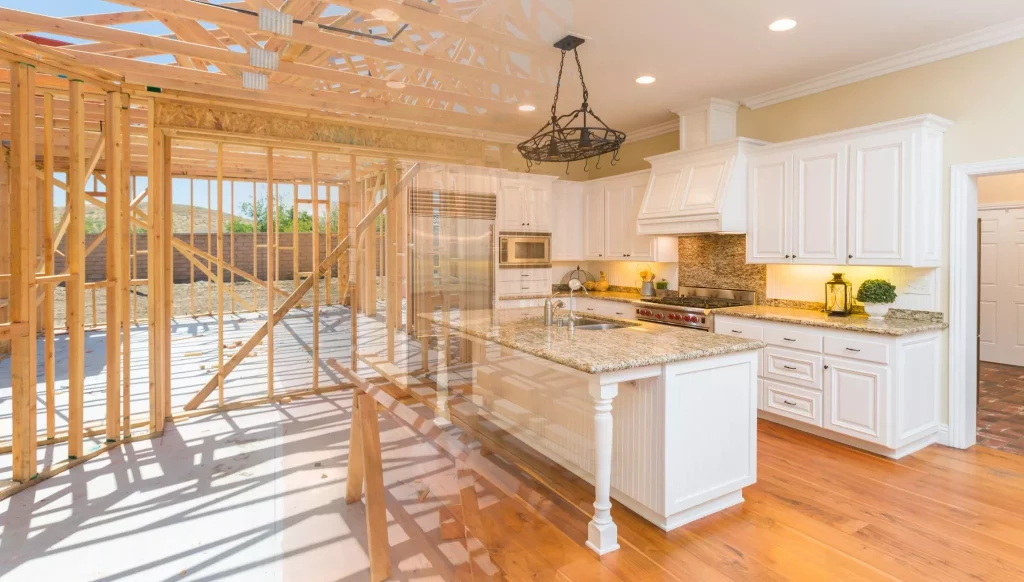
Seeing your dream home come to life right in front of your eyes is an incredible process. It’s something you’ve waited so long for, and you’ve picked out every little detail down to the colors, patterns, and finishes. There’s no denying that building your dream home requires many steps.
One of the most significant milestones comes when it’s time to put money on the table. If you’re trying to plan out the timeline or anticipate the next check you need to write, here’s an explanation of how you can approach the deal.
Financing a New Construction Home
When the down payment is due depends on how you’ve decided to finance your new construction project. There are several ways to go about this, including:
- Builder financing
- Construction-only loan
Each of these approaches requires you to put down a different amount at different points within the process. Some methods will require multiple down payments and require you to pay closing costs more than once, while others help simplify the process but require more money up-front.
Let’s go through your financing options one by one.
Builder Financing
Production homes are built to your liking, but they use floor plans (and sometimes materials) from a large builder, who may be building similar homes for multiple clients. You’ll then work with the builder to customize the details, like flooring and cabinets. Production homes are most found in new developments where you can purchase a lot and the soon-to-be-built home as a package.
Production homes are most often available with builder financing. This means the builder finances construction, and when construction is complete, you’ll need to obtain a mortgage. Once it is time to obtain the mortgage, the process is similar to buying an already-built home.
When is the down payment due on a new construction home with builder financing?
To start construction and set up builder financing, you’ll need to put down a builder deposit, which can feel like a down payment. You will also need to pay another down payment when you set up your mortgage after construction is complete.
Generally, the builder deposit is 10% of the total construction costs before construction begins. Once you’ve paid the builder deposit, you may have to pay the full cost of custom upgrades and change orders.
After construction is finished, you’ll take out a mortgage to pay off the builder and buy the lot. This mortgage will require a down payment, which could vary from 3.5% up to 30%, depending on the program and lender.
Builder Financing Process
- The builder finances the construction themselves.
- The buyer must pay a “builder deposit,” which means around 10% in earnest money.
- The buyer might need to pay for any additional upgrades or changes to the new construction home.
- When construction is complete, the buyer must obtain a standard mortgage.
- The buyer has to pay a down payment and closing costs when setting up the mortgage loan.
Ready to purchase a home? Start Now
Construction-Only Loan
If you’re building a completely custom home from scratch or working with a smaller builder, you will likely be sent down the path of getting a construction-only loan. This loan is obtained before the construction work begins, and it is a short-term loan.
A construction-only loan is paid in full or refinanced into your mortgage once construction finishes. This type of construction loan will require two application processes and two closings. It can become more expensive since a permanent mortgage is needed and will end up paying two separate loans and sets of fees.
How are new construction home loans paid?
When you obtain a new construction loan, you will be responsible for only paying interest until construction is complete. The bank tracks of disbursed funds when a specific portion of the home is completed. These loans are real estate secured but tend to have a higher interest rate due to being short-term.
You can save money on your new construction loan by making sure construction happens on time. If, for some reason, you get to the end of the short-term loan period before construction is complete, you will have to extend your current construction loan. If the construction lender approves, your construction loan either is extended or increased – for a cost.
Assuming your builder stays on schedule, and everything goes to plan, you’ll need to go to a lender and take out a standard mortgage loan when construction is complete. The new mortgage will be used to pay off your new construction loan balance. This will require you to pay closing costs , which will vary depending on the program and lender.
Construction-only Loan Process
- Buyer needs to obtain a new construction loan before construction work begins.
- These loans are short-term and have a higher interest rate.
- The buyer will obtain a standard mortgage when construction is complete.
- The buyer will pay closing costs for both the construction loan and mortgage that they obtain later.
Ready to purchase a home? Start Now
Can I pay less to my builder?
If you’re going with builder financing, you can try to negotiate the builder deposit (i.e., “earnest money“) that they require up-front. If they need additional money, like 20%, you could also consider foregoing some of the customizations for any custom upgrades you desire. But remember, the builder is taking on all the risks in a builder financing project, so they only have so much wiggle room.
On the other hand, if you’re trying to bring down your total construction costs (like for a new construction or combination loan), you can negotiate down rates or simplify the project to reduce how much you need to borrow. Instead of cutting corners, you could also plan to do some finishing work yourself, such as painting.
Stretching Your Cash for a New Construction Home
Every borrower wants to save as much money as possible regarding things like closing costs and down payments. The less money you need to pull out of your pocket for those expenses, the more flexibility you’ll have to make your home perfect.
The question is, how can you stretch your dollar for your new construction home? It starts with sitting down with a team of experts who can walk you through your options, talk about interest rates, and even introduce you to some state and federal programs that may be available to save you money.
Ready to take the next step? Call us today to take that initial step in your home-building journey! Our friendly professionals at Capital Bank are ready to sit down with you and help you determine the best way forward to your dream home.
